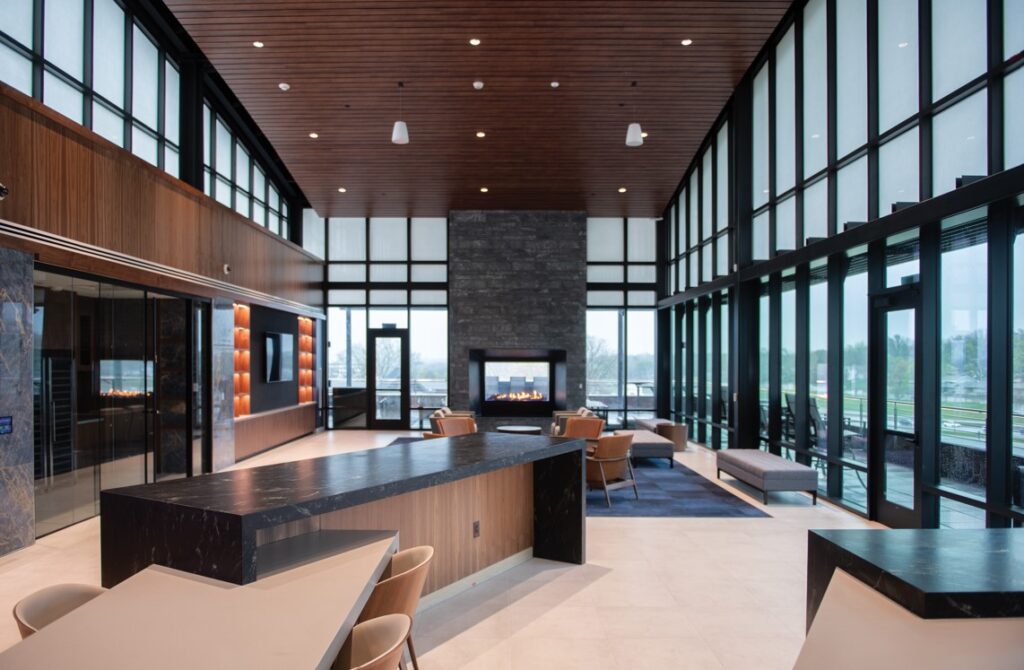As different as night and day

On a summer day a little more than one year ago, Gary Kirke sat in his office at West Glen Town Center and remarked that the unique retail, office and residential community was recession-proof.
Maybe not.
On any given night, West Glen is one of the most popular spots in Greater Des Moines, with a mix of restaurants and bars that attract a young and lively crowd, whose vehicles cram parking spaces and fill spots fronting retail stores.
That scene changes, dramatically some would say, during the day. The change is severe enough to drive some retailers to locations elsewhere in the metropolitan area. At the same time, other tenants have remained and praise the center for its eclectic mix of shoppers, diners and revelers.
More than $300,000 in property taxes that were due Sept. 30 had not been paid as of Nov. 18 on West Glen phase two, a blend of office, retail and residential buildings.West Glen has paid the more than $600,000 due on West Glen Town Center East and other featured segments of the development, such as buildings flanking the Avenue of the Arts.
The assumption is that taxes have not been paid because those new buildings are not generating enough cash flow to pay the bills on the newer properties. There are 19 vacant commercial spaces at the development, including about 21,000 square feet at the Keystone building, a mix of commercial space and apartments, and nearly 73,000 square feet in the Promenade Plaza office building. Both opened last year and are among the West Glen properties on which taxes have not been paid.
Jamie Buelt, who has acted as West Glen’s spokeswoman from the time it was in the planning stages, said the taxes will be paid.
Working out finances
One real estate expert said that for many property owners, withholding property taxes amounts to an operating loan at a steep interest rate – 1.5 percent a month, unless the taxes are sold at a tax sale, when they draw monthly interest of 2 percent.
And Kirke and other partners – Robert Horner, Terry Moss, Bill Van Orsdel and Robert Pulver – are working with their lenders to straighten out financing on the development, other sources in the Greater Des Moines real estate development and lending industries have told the Business Record. Original partner Tim Urban is no longer involved with the project.
Buelt would not comment on West Glen’s standing with its lenders.
The major lenders of record are First Bank, an early partner in the development, and U.S. Bank, which is the trustee of a $37 million loan first written in November 2006 by Countrywide Commercial Real Estate Finance Inc. That loan is currently valued at $34 million. West Glen investors Pulver and Horner loaned up to $3.6 million in September to its operating company. (Note: Updated Nov. 22 to clarify the current amount of the loan serviced by U.S. Bank.)
It is the loan serviced by U.S. Bank that is causing problems for West Glen. The nature of those problems could not be determined. However, it is not uncommon in the current lending environment for banks to scrutinize commercial loans as the value of property declines during the recession and development properties lack tenants to generate cash flow that services debt and pays taxes.
Buelt said leasing difficulties and empty storefronts are due to the recession and are not unlike similar problems experienced by other Greater Des Moines developers and property owners. (Note: Updated Nov. 22 to clarify Buelt’s comments.)
And, lenders are not eager to take possession of real estate. They lack the expertise to manage it, and it is a drag on their balance sheets. Area banks are just beginning to see improvements in the amount of bad loans that they have carried since the real estate collapse in 2007 and 2008.
Workout specialists note that lenders are more likely to work with borrowers who have weak collateral, they say, taking the stance that if you have the wherewithal to pay a loan, you should pay it.
Others agree that owning and managing commercial property, especially property with a retail component, is a challenge. Consumers aren’t convinced that the recession has ended, despite numbers showing that retail sales have increased slightly in recent months.
Kurt Mumm, president of NAI Ruhl & Ruhl Commercial Co.’s Des Moines region, pointed out that in this economy, it is not uncommon to have a “hot” center within blocks of a retail center that is underperforming.
He could not speak to West Glen specifically, other than to say, “It’s a great development with wonderful people who will make sure it succeeds.”
And that is the theme of most real estate experts who were interviewed for this story. The problems at West Glen, if there are any, they caution, are not uncommon. If not for the recession, the collapse of credit markets that triggered it and the tight lending environment that resulted, West Glen and most commercial properties would be thriving.
This is, after all, Greater Des Moines, where the economy gets neither so good nor so bad that setbacks can’t be overcome.
As one West Glen retailer put it, “It does get overwhelming sometimes, but you have to keep putting one foot in front of the other and everything will work out.”
She loved it, but left it
During that interview in 2009, Kirke commented on the fact that 10 years ago, when West Glen was being crafted as its own community, there were no models to draw from, at least not in Iowa.
The idea that in one location people could “shop, work, live and play,” as the town center’s slogan reads, was novel, but not unlikely to spring from the minds of businessmen who already had built successful enterprises from scratch.
It was an idea that attracted Diane Lahodny, owner of Campbell’s Nutrition Centers Inc. Her Des Moines store was a success, and West Glen provided an opportunity to open another store in a location that would draw a mix of shoppers.
Campbell’s Nutrition Center was one of the first stores to open in West Glen’s Town Center East, a mix of offices, retail stores and apartments that served as the defining theme for much of the development.
Lahodny got the opportunity to design the interior of the store from the ground up, and that included adding a product mix – shoes, clothing, organic sheets – that would not draw much attention at her store on University Avenue in Des Moines.
She pulled out of West Glen in March, due in large part to the lack of shoppers passing by her storefront.
“There’s not enough traffic – not enough of a useful mix of stores to attract that traffic,” she said.
Lahodny said she was the 18th of the original 22 businesses to leave. She is glad she left, but “it was heartbreaking when we had to close.”
Night life vs. baby shop
Tanya Keith entered West Glen with aggressive goals and high expectations. Her Simply for Giggles baby shop was a success in the East Village. She opened a second store in West Glen because many of her customers were traveling from West Des Moines.
“I was optimistic about being at West Glen,” she said.
She stayed for two years, closing in 2009.
“We became very frustrated,” Keith said. She didn’t think management reacted quickly enough to the changing economy, focusing on West Glen’s night life rather than on its retail shops.
Her customers – mothers, grandmothers, uncles and aunts – were overwhelmed by the party atmosphere that prevailed after 5 p.m.
“When my customers would stop, the parking lot was jammed with the people out for happy hour,” she said.
Keith also makes an observation about the difference between operating a store in West Glen and operating one in the East Village, where her original store is located near East Fifth and Locust streets.
“I feel like the East Village has grown up organically, and there is a manufactured sense to West Glen,” she said.
Night life is a good draw
You won’t find Pat Artis or Victoria Jorgenson bemoaning the crowds drawn to West Glen at night. Every face in the crowd represents a potential customer and, as even some bar-hoppers will tell you, the crowds seem to be maturing.
Jorgenson put her South Dakota home on the market last year and journeyed to West Glen to open Bella Boutique, a national brand that has stores in six states specializing in low-cost, designer-inspired clothing, handbags, jewelry and other accessories.Her South Dakota home has not sold because of the recession and slow real estate market, but her West Glen store has prospered in the year it has been open.
“We love the West Glen area. We think it’s a diamond in the rough right now,” said Jorgenson, who opened Bella Boutique a little more than a year ago in Town Center East.
She does take note that a few storefronts near her shop are empty, but said those will fill again, in time. As for Bella Boutique, it has survived its first year at West Glen, and few business owners would quibble about making it through their first year, regardless of location, Jorgenson said.
West Glen is an “awesome” area, she said. Combined with a mix of stores carrying local merchandise and national brand names, it draws a wide range of shoppers, which has allowed Jorgenson to expand her inventory beyond the original business plan.
That means that handbags priced below $50 share space with ones priced above $100. She is selling specialty chocolates and lotions and other items that fall outside Bella Boutique’s standard price point.
Jorgenson also notes that special events attract customers to her store. And West Glen gets a summer boost from people who travel to West Des Moines, stay at the nearby Drury Inn and shop at West Glen, Jordan Creek Town Center, Galleria and other retail complexes in the area.
“Because Bella Boutique is a destination store, I think we bring more people to West Glen, too,” she said.
Pat Artis is another business owner who is keen on the West Glen template.
Her family has been in the furniture business since the 1920s, and when its Urbandale store closed in August 2009 a new business plan was crafted for a store that would open just a few weeks later in West Glen.
Artis wanted to open Artis Home Gallerie in West Glen because of the gated community – Glen Oaks – right across Mills Civic Parkway, the lively night life and the concept of community that the developers have promoted.
“It generates a younger crowd that we are trying to attract who are saying, ‘I don’t want to buy at the big box anymore; I want to buy some quality,’” Artis said. “It’s a new, wonderful development, it’s fresh and young, and that’s why we came out here. The housing market is in the toilet, but when it picks back up, the housing will attract more customers to our new business.”
Her main market is the 35- to 40-year-old shopper, but she is reaching out to a younger crowd as well. West Glen can draw from both groups, she said.
“We’ve got a lot of young people in the lofts up above, she said. “It generates newness; having young people around always makes you feel better.”
Still, Artis and Jorgenson would like to see more retailers fill the vacant spaces at West Glen. Artis notes that, discounting the apartments, she is surrounded by empty space in the Keystone building, which is a mix of commercial and residential space.
The pace of development
Buelt noted that the developers have met all of their targets for the build-out of West Glen. It provides a mix of national brands and “local jewels of retailing,” such as Schaffer’s, which has two stores at West Glen, Josephs Jewelers and Sticks, not to mention stores that have carved a niche, such as Three Dog Bakery.
Most retailers would envy traffic studies that show about 65,000 vehicles traveling nearby on Interstate 35 each day. A SuperTarget store that serves as West Glen’s anchor to the east hosts between 10,000 and 12,000 cars a day.
“When West Glen was conceived in 2003, the partners understood this was a long-term project,” Buelt said. “It is still a long-term project; the difference is we’re battling a recession now, which changes the rules of the game.
“From this perspective, West Glen faces the same challenges as any other developer and property owner in the market. We have empty spaces to fill at a time of zero to limited growth and expansion by national retailers as well as local businesses,” Buelt said.
Regardless of what happens with the loan, Buelt and others say that West Glen will survive as a model of a successful development vision.








